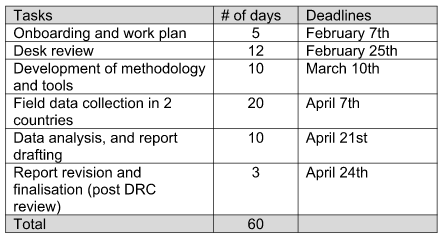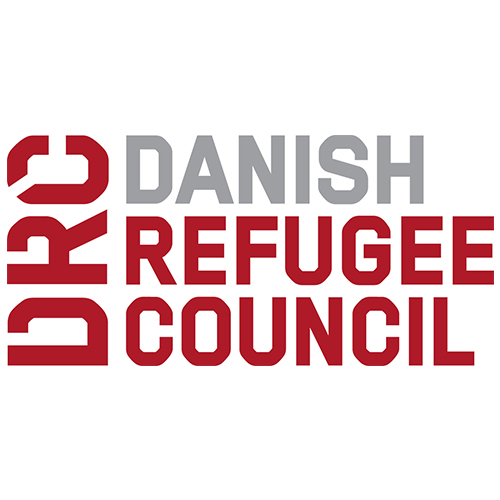(offre en anglais) Consultant – The Danish Refugee Council Retour vers les opportunités
Danish Refugee Council
Lance Appel à candidaturesÉchéance
24 Janvier 2020 Il y a 6 ans
Critères d'éligibilité
Cliquez ici pour parcourir les critères d'éligibilitéPartager l'opportunité sur
Détails de l'opportunité
Terms of Reference Protection Programming in Mixed Migration context consultancy – West and North Africa
- Introduction and background
Contemporary mixed migration flows within Africa and/or towards Europe are dynamic, pose particular operational and security challenges and require a comprehensive and flexible response to tackle the high protection risks faced by people on the move. The current migration context, along various routes, requires improved understanding of the protection risks and vulnerabilities in both source and transit countries in order to respond appropriately. The profile of migrants within these flows changes, routes close down while new routes open up, local political and economic contexts both shape, but are also shaped by migration flows and the rights violations that migrants en route face differ from one place to another but are omnipresent all along the route. Despite these challenges and risks, including high levels of abuse and human rights violations, as well as the tough migration control and border securitisation policies that have stemmed flows, the number of migrants and refugees deciding to undertake a migration journey is still substantial.
As protection focused humanitarian agencies, DRC and IRC have had to challenge their ways of working and Standard Operating Procedures (SOPs) in order to adapt traditional protection programming to a dynamic target population that tries to remain invisible and is often in an irregular status at least at some point in the journey. As part of a DFID funded grant, the Mediterranean Mixed Migration (3M) response programme, IRC and DRC have been implementing protection activities in Mali (since April 2019), Niger and Libya (since June 2018). Providing services such as case management, legal assistance, and direct assistance has shown to be very challenging due to the context and political environment around the criminalisation of migration across the continent. The focus has often ended up being by default to provide individualised protection assistance (IPA) and services that provide a short-term impact (one-off cash assistance). As part of the programme, the Migration Emergency Response Fund (MERF) managed by the Start Network, has allowed for humanitarian agencies to provide short term responses to increased flows or systemic gaps in the response across West and North Africa. The Mixed Migration Centre (MMC) has been collecting, analysing and sharing data related to protection incidents, perpetrators, demographics of people on the move, among others. However, the dynamic and invisible nature of our target beneficiaries has been posing multiple challenges when trying to implement protection activities to the standard that our organisations strive to reach.
- Consultancy objectives
Overall purpose of the consultancy: The overall purpose is to better understand how protection focused humanitarian actors, specifically IRC and DRC, can adapt traditional protection programming to the mixed migration context where the target population is dynamic and invisible.
Specific objectives of the consultancy: The Consultant will work in collaboration with the CCU MEAL team, as well as Protection Coordinators from both agencies. Core responsibilities will include, 1) developing the methodology and execution of this evaluation, 2) desk review of the minimum standards for protection activities in global humanitarian practice as well as within DRC and IRC, 3) undertaking data collection in 2 of the countries we work in (Mali, Niger and Libya) assessing the activities implemented, the challenges they present in the context and how they have had to be adapted, 3) providing recommendations on how to improve protection programming in the mixed migration context or building a narrative that explain why only a certain standard can be reached in this particular context and what external factors would need to change in order to implement higher quality protection activities, including improved advocacy. All work should be aligned with existing DRC and IRC programming priorities and principles, with particular linkages to both organisations’ protection programme.
Key responsibilities: The Consultant will be expected to provide the following deliverables: 1) work plan, 2) evaluation methodology with at least two tools, 3) desk review of protection standards that are relevant to this context, 4) written assessment report with recommendations. These deliverables are expected to be provided through the following activities:
- Review DRC, IRC and global protection resources, practices and standards;
- If available, look at country level protection strategies and the alignment between the response to people on the move and the country level protection strategy;
- Use information from other contexts where DRC is implementing responses to people on the move – e.g. Ethiopia and Sudan.
- Conduct a desk review of existing DRC and external resources to inform an analysis of the types of protection activities that are relevant to the Mixed Migration context and the standard we should strive to adhere to;
- Develop an evaluation methodology to assess the extent to which those standards are reached in our current operations;
- Develop an interview and data collection schedule, with support from DRC and IRC staff as necessary;
- Identify key stakeholders and conduct field interviews and data collection directly or through selected enumerators;
- Analyse data into an initial set of findings, supporting additional data collection as identified;
- Identify gaps in existing protection response targeting people on the move;
- Assess identified gaps to share protection advocacy needs and provide recommendations to DRC and IRC’s advocacy team;
- Summarise the gaps identified into a single report and provide recommendations on how to improve protection programming in the mixed migration context and/or build a narrative that explain why only a certain standard can be reached in this particular context and what external factors would need to change in order to implement higher quality protection activities. The report is expected to provide recommendations to IRC and DRC’s protection teams as well as the wider humanitarian community working in this context.
- Consultancy scope
The consultancy should cover several programmes across West and North Africa, focusing specifically on field visits to two countries where we have mixed migration protection programming (Niger, Mali and/or Libya).
- Methodology
The consultant is expected to develop a detailed evaluation methodology based on their understanding of the terms of reference. The final methodology shall be agreed upon between the consultant and the Consortium partners.
Data Collection: While the onus to choose the study design and data collection methodologies is left to the consultant, the consortium strongly recommends that both quantitative and qualitative methods should be used. The quantitative methods shall include use of questionnaires to capture specific protection experiences, while qualitative methods such as desk review, focus group discussions shall be used to capture community or group experiences. The focus group discussions shall be conducted with groups of selected stakeholders on the basis of sex, age, or a combination. However, the final methods have to be agreed upon between the consultant and Consortium.
- Deliverables
- Inception report with desk review;
- Copy of methodology and tools;
- Transcripts of data collection;
- Final report
- Timeframe
This timeframe is tentative and will be revised based on the consultant’s proposal. 
Number of working days: 60.
Estimated start date of consultancy: February 3, 2020.
Date of submission of the final report: April 24, 2020.
In advance of each phase of work, the Consultant will be expected to confirm with the DRC Protection Coordinator that the number of days outlined above remains appropriate; maximum figures can be reduced or increased as required, at the discretion of the DRC. Accordingly, deadlines for all deliverables will be finalised based on consultation with DRC and will be no later than April 21st 2020 for the first draft of the report.
- Reporting Line
The consultant will report jointly to the Head of CCU and the CCU MEAL Coordinator and will liaise closely with the consortium partner agencies and country offices.
We offer
DRC will offer the successful applicant a 60 working-day contract, the assessment must commence no later than February 3, 2020.
DRC will pay consultancy fees at a mutually agreed rate.
DRC will provide recommendations for travel and accommodation with logistical arrangements. International and local flights, accommodation and local transportation will be covered by the consultant.
If the consultant visits an area that is deemed an insecure environment, this should be decided in coordination with DRC and restrictions may apply. DRC will provide security information and the consultant is expected to follow DRC security procedures.
DRC and IRC staff located in the assessment areas will provide necessary support to the consultant.
Critères d'éligibilité
- The Consultant is expected to have strong migration and protection expertise;
- Experience in West and/or North Africa is essential;
- Fluency in written and spoken English is required with French and/or Arabic being a strong added value;
- At least 4 years senior experience in the fields of protection and migration programming in complex conflict settings; experience designing and establishing protection programming is highly preferred;
- Experience in producing protection analysis or human rights reporting (work samples to be provided);
- Technical capacity developing assessment methodology and conducting data analysis and mappings;
- Self-motivated, able to take initiative, resilient and able to work independently;
- Ability to produce timely and high-quality written reports;
L'opportunité a expiré
Cette opportunité n'est malheureusement plus disponible sur Jamaity. Visitez régulièrement la rubrique opportunités pour ne plus en rater.
Contacts
The Danish Refugee Council
Suivez Jamaity sur LinkedIn
Obtenez Jamaity Mobile dès maintenant

Publié sur Jamaity le 20 janvier 2020
Découvrez encore plus d'opportunités sur Jamaity en cliquant sur ce lien.


